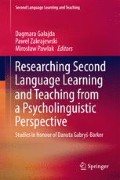Abstract
Teaching occurs in a complex and dynamic environment that involves other people—learners, their families and school authorities as well as the subject matter to be taught. Expectations towards the effects of teaching are high, though opinions about teachers may be harmful. What is a contemporary teacher like, then? The aim of this article is to present a portrait of an average teacher on the basis of selected empirical evidence from TALIS 2013 survey (OECD, 2014). Also teachers’ emotions and their relations with job satisfaction and overall success are discussed. Finally, empirical evidence from a case study on job satisfaction, enjoyment and success of Polish teachers of English is discussed. Polish ELT teachers are both similar to and different from a typical (average) TALIS 2013 teacher. They are satisfied with their job and they experience positive emotions when their learners make progress, achieve goals and are motived to learn English. They feel they are successful but at the same time they realize that success is a complex phenomenon that has many sources and many manifestations.
Access this chapter
Tax calculation will be finalised at checkout
Purchases are for personal use only
References
Bandura, A. (1994). Self-efficacy. In V. S. Ramachaudran (Ed.), Encyclopedia of human behavior. Volume 4 (pp. 71–81). New York: Academic Press (Reprinted in H. Friedman (Ed.), Encyclopedia of mental health. San Diego: Academic Press, 1998).
Bandura, A. (1997). Self-efficacy: The exercise of control. New York: Freeman.
Becker, E. S., Keller, M. M., Goetz, T., Frenzel, A. C., & Taxer, J. L. (2015). Antecedents of teachers’ emotions in the classroom: an intraindividual approach. Frontiers in Psychology., 6, 635. doi:10.3389/fpsyg.2015.00635
Carson, R. L. (2006). Exploring the episodic nature of teacher emotions as it relates to teacher burnout. Unpublished PhD dissertation. Purdue University, USA. Retrieved from http://docs.lib.purdue.edu/dissertations/AAI3232157/
CBOS. (2009). Prestiż zawodów [Prestige of professions]. Retrieved from http://www.cbos.pl/SPISKOM.POL/2009/K_008_09.PDF
Dewaele, M., & MacIntyre, P. D. (2014). The two faces of Janus? Anxiety and enjoyment in the foreign language classroom. Studies in Second Language Learning and Teaching, 4, 237–274.
European Commission. (2012). First European survey on language competencies. Retrieved from http://ec.europa.eu/languages/eslc/docs/en
Gajewska-Dyszkiewicz, A., Kutyłowska, K., Kulon, F., Paczuska, K., Rygielska, L., & Szpotowicz, M. (2012). Lekcja języka angielskiego z perspektywy uczniów klas trzecich gimnazjum [An English lesson in the eyes of third-grade junior high school students]. Edukacja, 3, 87–104.
Hernik K., Malinowska K., Piwowarski R., Przewłocka J., Smak M., & Wichrowski A. (2014). Polish teachers and principals—An international perspective. Key findings of TALIS 2013. Warsaw: Educational Research Institute.
Kim, C., & Pekrun, R. (2014). Emotions and motivation in learning and performance. In J. M. Spector, et al. (Eds.), Handbook of research on educational communications and technology. (4th ed., pp. 65–76). New York: Springer.
MacIntyre, P. D., & Mercer, S. (2014). Introducing positive psychology to SLA. Studies in Second Language Learning and Teaching. Special issue: Positive Psychology, 4, 153–172.
Martin, A. J. (2006). The relationship between teachers’ perceptions of student motivation and engagement and teachers’ enjoyment of and confidence in teaching. Asia-Pacific Journal of Teacher Education, 34, 73–93.
OECD. (2014). TALIS 2013 results: An international perspective on teaching and learning. TALIS: OECD Publishing. Retrieved from. doi:10.1787/9789264196261-en
Op’t Eynde, P., De Corte, E., & Verschaffel, L. (2006). Epistemic dimensions of students’ mathematics-related belief systems. International Journal of Educational Research, 45, 57–70.
Oruç Ertürk, N. (2013). The role of altruism in the motivation of English language teachers. Ekev Academy Review, 17, 173–186.
Oxford, R. (2015). Emotion as the amplifier and the primary motive: Some theories of emotion with relevance to language learning. Studies in Second Language Learning and Teaching, 5, 371–394.
Pyżalski, J. (2010). Czynniki salutogenne (wspierające dobrostan nauczyciela w pracy). [Factors supporting teachers’ well-being at work]. In Pyżalski, J. & D. Merecz (Eds.). (2010). Psychospołeczne warunki pracy polskich nauczycieli. Pomiędzy wypaleniem zawodowym a zaangażowaniem [Psychosocial conditions of the work of Polish teachers. Between burnout and engagement] (pp.107–115). Kraków: Impuls.
Pyżalski, J., & Merecz, D. (Eds.). (2010). Psychospołeczne warunki pracy polskich nauczycieli. Pomiędzy wypaleniem zawodowym a zaangażowaniem [Psychosocial conditions of the work of Polish teachers. Between burnout and engagement]. Kraków: Impuls.
Skaalvik, E. M., & Skaalvik, S. (2007). Dimensions of teacher self-efficacy and relations with strain factors, perceived collective teacher efficacy, and teacher burnout. Journal of Educational Psychology, 99, 611–625.
Skaalvik, E. M., & Skaalvik, S. (2009). Does school context matter? Relations with teacher burnout and job satisfaction. Teaching and Teacher Education, 25, 518–524.
Skaalvik, E. M., & Skaalvik, S. (2015). Job satisfaction, stress and coping strategies in the teaching profession—What do teachers say? International Education Studies, 8, 181–192. doi:10.5539/ies.v8n3p181
Smak, M., & Walczak, D. (2015). Pozycja społeczno-zawodowa nauczycieli. Raport z badania jakościowego [Social and professional status of teachers. A qualitative study report]. Warsaw: Educational Research Institute.
Sutton, R. E., & Wheatley, K. F. (2003). Teachers’ emotions and teaching: A review of the literature and directions for future research. Educational Psychology Review, 15, 327–358.
Author information
Authors and Affiliations
Corresponding author
Editor information
Editors and Affiliations
Rights and permissions
Copyright information
© 2016 Springer International Publishing Switzerland
About this chapter
Cite this chapter
Piasecka, L. (2016). Teaching Matters: Enjoyment and Job Satisfaction. In: Gałajda, D., Zakrajewski, P., Pawlak, M. (eds) Researching Second Language Learning and Teaching from a Psycholinguistic Perspective. Second Language Learning and Teaching. Springer, Cham. https://doi.org/10.1007/978-3-319-31954-4_12
Download citation
DOI: https://doi.org/10.1007/978-3-319-31954-4_12
Published:
Publisher Name: Springer, Cham
Print ISBN: 978-3-319-31953-7
Online ISBN: 978-3-319-31954-4
eBook Packages: EducationEducation (R0)

